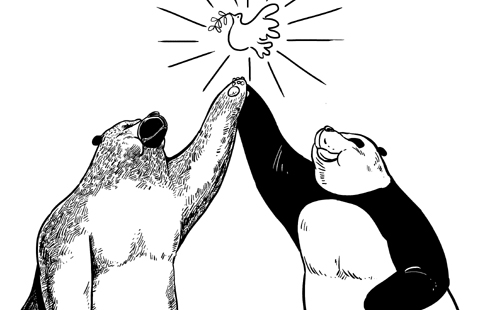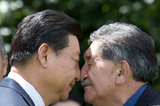
China, Russia eye investment in advanced technologies
Updated: 2015-05-11 15:53
By Fu Jing in Moscow and Liu Jia in Brussels (chinadaily.com.cn)
Comments Print Mail Large Medium SmallRussia and China are keen to extend their close relationship from strategic cooperation and energy projects to advanced technology such as nano and space sectors, which can enrich China's proposals of "One Belt, One Road" proposals, said the chiefs of Russia's tech giants.
Anatoly Chubais, former deputy Prime Minister of Russia and now chairman of the Executive Board of the Russian Corporation of Nanotechnologies (Rusnano), said his company has already identified a Chinese partner to set up a joint fund to explore cooperation in high-tech sectors.
Vasily Belov, Senior Vice-President of Innovations development of Skolkovo Foundation in Russia, said Chinese high-tech businesses are welcome to invest in Russia and his foundation is well prepared to invite Chinese companies to attend science and technology fairs in Moscow next year.
"We are identifying businesses in high-tech cooperation between China and Russia, which could better bolster the two country's regional development proposals," said Belov in an interview with China Daily during President Xi Jinping's visit to Russia, the second leg of his three-country tour from 5-12 May.
Xi and Russian President Vladimir Putin sought to reach a consensus in connecting China's construction of the Silk Road Economic Belt with Russia's construction of the grand Eurasian passage and the development of the Eurasian Economic Union during their meeting on Friday.
Belov's foundation in Russia has been supporting the development of nuclear, space and information technologies and last month, it teamed up with China's Cybernaut Investment Group to create a $200 million venture fund to stimulate high-tech innovations of mutual interest. "Based on this ,we can extend our bilateral cooperation from energy to high-tech sectors, and we need to boost student exchange and even set up a joint university," said Belov.
Chubais' Rusnano has been meeting Chinese side and Chinese businesses sector and minister of science and technology Wan Gang, who has recognized the importance of boosting high-tech cooperation with Russia.
"We have found Chinese partners to set up joint fund and Chinese minister of science and technology has shown great interests in telecom, composite industry, surface modification and coating, in nano-optics, photonics and electronics, energy efficiency," said Chubais during the interview with China Daily.
Chubais has proposed to set up together a new private equity fund, which may be co-finance 50 percent by Russian side and 50 percent by China, and his Rusnano is keen on taking the responsibility from Russia side. Chubais has already reported the development to Putin earlier this year.
" If we are speaking about the cooperation, there should be money. It would be difficult for cooperation without money," said Chubais. "And that's the idea of fund...So the fund from the financial side and we need to add pipeline, we need to add the projects to this fund. Then it will be bridging the cooperation between Russia and China."
Chubais said China and Russia have quite good cooperation in energy-oil, gas, commodities and consumer goods came from China. "But my belief is that there is a huge new room for opportunities- that's high-tech," he said.
Chubais said Chinese high-tech companies should invest and expand their businesses in Russia, instead of exporting to Russia only.
"So I believe that in high-tech, we should think not only about export and import. We should think about investing which can develop technologies, bring Chinese technologies to Russia, Russian technologies to China," said Chubais.
China has already shown the intention to explore the cooperation in high-tech sectors with Russia but the progress is slower than expected. The topic was on the discussion agenda of Xi and Putin during their meeting on Friday.
Belov attributed the slower progress to cultural difference and language barriers. "So we need to boost the exchanges and remove such barriers urgently," said Belov.





